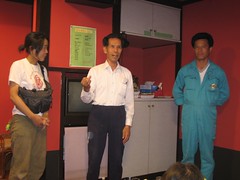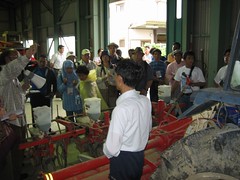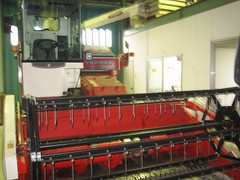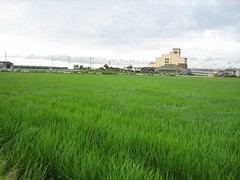 One of the most interesting high-technology yet organic farms visited during the AFA seminar workshop in Japan was Mr. Harada’s farm, consisting of an orchid green house using in-vitro fertilization and a rice field. Mr. Harada used to be a manager of Ainokai 15 years ago. There, he learned a lot of technologies, which he still uses to date.
One of the most interesting high-technology yet organic farms visited during the AFA seminar workshop in Japan was Mr. Harada’s farm, consisting of an orchid green house using in-vitro fertilization and a rice field. Mr. Harada used to be a manager of Ainokai 15 years ago. There, he learned a lot of technologies, which he still uses to date.
More than the efficient technology and the organic farming technology he uses, what is admirable about Mr. Harada’s rice farm is the motivation behind it.
“Less and less Japan farmers are going into rice farming,†Mr. Harada noted sadly, “and my biggest motivation for going into organic rice farming is to show the Japanese farmers that it can also be viable.â€
farming,†Mr. Harada noted sadly, “and my biggest motivation for going into organic rice farming is to show the Japanese farmers that it can also be viable.â€
The participants noted that his rice farm is something very similar to the systematic rice intensification or SRI technology, which is popular in countries like the Philippines and Cambodia. The rice production uses a high-density planting method, which eliminates the need for weeding. It is the Aichi method of growing rice, which is propagated in Japan.
rice, which is propagated in Japan.
Mr. Harada also gets a lot of help from transplanting machines that can plant seeds in 1 hectare of land in only 20 minutes. The use of these highly-efficient machines is intimately related to the problem of dwindling farming population in Japan.
“Most of the young people are working in factories,†said Harada, “and farming is left to the older people who cannot operate heavy machines.†Thus, there is a need to invest in machines that can do lot of work but can be operated by few and old people.
who cannot operate heavy machines.†Thus, there is a need to invest in machines that can do lot of work but can be operated by few and old people.
For organic rice, the yield is 4,200 kilos per hectare. For non-organic rice, it is 4,800 kilos per hectare. But in terms of price, a 60-kilo bag of non-organic rice costs 15,000 yen, while a 60-kilo bag of organic rice costs 20,000 yen.
“There is a 10% decrease in production and a 20% increase in price for organic rice,†Harada reveals.



Comments are closed